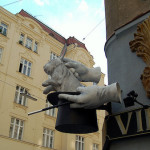We run our website the way we wished the whole internet worked: we provide high quality original content with no ads. We are funded solely by your direct support. Please consider supporting this project.

A Brief Theology of Sin
We were created for unbroken, loving fellowship with God. We see this in the creation story. As we share in this unbroken, trusting fellowship with God, we participate in the very love that the Father, Son, and Holy Spirit share throughout eternity. We also read in the creation story that sin ruptured this fellowship and sidetracked God’s plan. The origin and essence of sin is rooted in how we understand the Tree of the Knowledge of Good and Evil.
The first thing we need to notice about the Tree of the Knowledge of Good and Evil is that it was located in the middle or the center of the garden, along with the Tree of life. Here God provided a provision and a prohibition. The Tree of Life was God’s provision to meet our needs and share his life endlessly. The Tree of the Knowledge of Good and Evil was God’s prohibition against humans overstepping their proper domain.
God provided a “No Trespassing” sign to protect us from overstepping our finitude. At the center of the beautiful existence God wills for us is the humble recognition that we are not God and thus must leave to God what God wills to keep for himself, namely, the knowledge of good and evil.
As the Creator, God alone has the right and the ability to define good and evil. When God administers judgment, knowing good and evil, it serves God’s purpose of inviting agents into his love. When humans try to do this, however, it tends to facilitate death for ourselves and others.
Our fundamental sin is that we place ourselves in the position of God and divide the world between what we judge to be good and what we judge to be evil. And this judgment is the primary thing that keeps us from the doing the central thing God created and saved us to do, namely love like he loves.
God alone knows each human heart. God alone knows what each person was originally given to work with in terms of his or her psychological, physical, and even spiritual aptitudes. God alone knows the myriad factors that influence each decision people make. And God alone knows the extent to which people choose what they do out of their own free will and the extent to which their choices are the result of factors outside themselves. Unless we are intimately involved in a person’s life, this information is completely hidden from us. Hence, while there are intimate contexts in which we are to hold each other accountable, Scripture uniformly testifies that God alone is able to judge and warns us not to judge. (See Matt 7:1-5.)
The essence of sin according to the Genesis account is the transgression of this proper boundary. We are not satisfied with being God-like in our capacity to love; we also want to become God-like in our capacity to judge, which is how the serpent tempts us. But in aspiring toward the latter, we lose our capacity for the former, for unlike God, we cannot judge and love at the same time.
The essence of sin is that we play God. We critically assess and evaluate everything and everyone from our limited, finite, biased perspective. Instead of simply receiving life from the Tree of Life, we try to derive our likeness of God, our life and worth, from that which is forbidden at the center or our existence, the knowledge of good and evil.
—Adapted from Repenting of Religion, pages 67-68
Photo credit: Shaikhji via VisualHunt.com / CC BY-ND
Related Reading

Avoiding the “S” Word: Sin
In our culture today, we don’t like to talk about sin. While most of us have a deep sense that something is off, that something is wrong with ourselves and the world, and many know or feel that they are guilty of something, this kind of talk is avoided. Instead, we evaluate ourselves by our…

The Kind of Sin Jesus Publicly Exposes
Image by danny.hammontree via Flickr Religious sin is the only sin Jesus publicly confronted. The religious variety of the forbidden fruit is the most addictive and deceptive variety. Instead of acknowledging that judging others is prohibited, religious idolatry embraces the knowledge of good and evil as divinely sanctioned and mandated. It gives the illusion of being on…

Faith or Magic?
Many Christians today treat faith like magic. While the content of what Christians believe is obviously different from pagan practitioners of magic, the way they believe and the motive they have for believing, seems to be very similar. Magic is generally understood to involve people engaging in special behaviors that empower them to gain favor…

Sermon Clip: Tough To Love
Learning how to love the people in our life that we find challenging to deal with is often very difficult. This week in Heart Smart Greg Boyd looks at some biblical examples and instructions on how to love our enemies in the same way we love our friends. Full Sermon Here: http://whchurch.org/sermons-media/sermon/tough-to-love

The Cleansing of the Temple and Non-Violence
Jesus’ cleansing of the Temple is the most commonly cited example of those who allege that he did not absolutize loving enemies or refraining from violence. I submit that this episode implies nothing of the sort. First, it is important that we understand that this episode was not an expression of unpremeditated anger on Jesus’…

Hungry Hearts
Every human being with normal mental and emotional faculties longs for more. People typically associate their longing for more with a desire to somehow improve their lot in life—to get a better job, a nicer house, a more loving spouse, become famous, and so on. If only this, that, or some other thing were different,…
